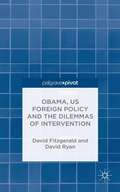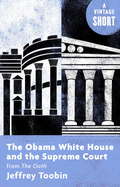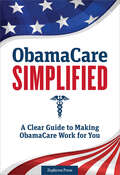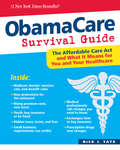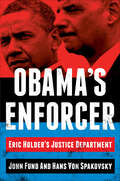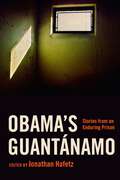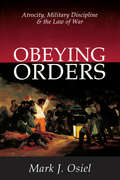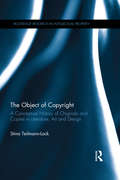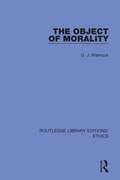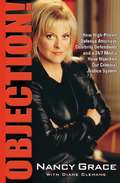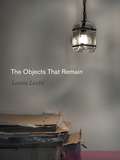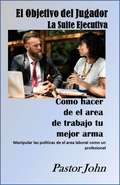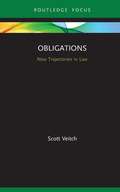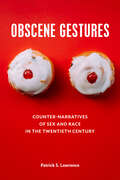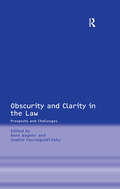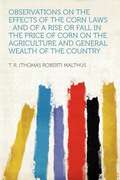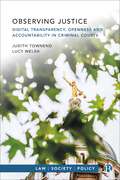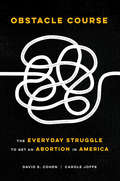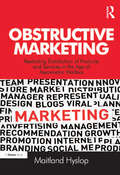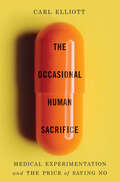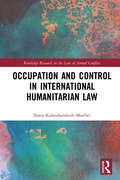- Table View
- List View
Obama, US Foreign Policy and the Dilemmas of Intervention
by David Fitzgerald David RyanThis timely study analyses the ways in which competing ideologies and cultural narratives have influenced the Obama administration's decision-making on Iraq, Afghanistan, Libya and Syria, situating these decisions within the broader history of American foreign policy.
The Obama White House and the Supreme Court: from The Oath
by Jeffrey ToobinA Vintage Shorts SelectionThe bestselling and prizewinning author of The Nine and American Heiress tells the dramatic and gripping insider's story of the momentous ideological war fought between the Obama White House and the Supreme Court.President Obama and Chief Justice Roberts could not be more different. Obama, a legal conservative grappling with the second amendment among other issues, believes in the close interpretation of the Constitution, incremental change, and pragmatism over ideology. But, for Roberts the law is all about winning. And, from the moment he botched Obama's oath of office in 2009, the relationship between the Court and the White House has been fraught.This is essential history that unravels the forces that have shaped the Roberts Court over the last eight years. The nation is preparing to vote for its next president, and it bears remembering that the future of the Supreme Court will also be on the ballot.An ebook short.
Obamacare Simplified: A Clear Guide to Making Obamacare Work for You
by Zephyros PressObamaCare is a complex law that will affect every single American. Everyone has an opinion about ObamaCare, but few people actually understand how the Affordable Care Act works. ObamaCare Simplified navigates you through the intricacies of the health care law and explains what it means for you. Whether you are satisfied with your present insurance or seeking to get insured, ObamaCare Simplified informs you of your rights, presents the facts, and will help you make well-informed decisions when it comes to your health care plan. ObamaCare Simplified provides an easy-to-follow guide to the Affordable Care Act and what you need to know, offering: An overview of the goals and structure of ObamaCare, and how it changes the current health care system A "how it works" section that explains the individual mandate, insurance exchanges, and ObamaCare funding An ObamaCare timeline that provides a year-by-year breakdown of the law's implementation and what you need to know Spotlights on "what ObamaCare means for you," which explore the different impact of the law on various groups, including: senior citizens, immigrants, small-business employers, employees, uninsured individuals, and more Information on how ObamaCare affects individuals, depending on age, income, and employment status Taking care of your health should be your most vital priority. ObamaCare Simplified is your complete guide to understanding how ObamaCare works and what it means for your health care.
ObamaCare Survival Guide
by Nick J. TateWhen President Barack Obama signed the Patient Protection and Affordable Care Act, he handed Americans one of the most sweeping pieces of social legislation in U.S. history. Now that the Supreme Court has upheld ObamaCare, it is imperative that the American people understand the overwhelming impact it will have on their lives. The Affordable Care Act totals more than 2,700 pages and comprises nearly 500 provisions. For the first time, Humanix Books provides an easy-to-read guide to the law and its implications for every American. The ObamaCare Survival Guide: The Affordable Care Act and What It Means for You and Your Healthcare is the first guide book to help Americans understand the intricacies of ObamaCare. It serves as a valuable resource for those currently insured, those who are not, and the tens of millions of seniors, youth, business people and others who will be affected by the new law. About the Author: Nicholas J. Tate is an award-winning journalist and editor who has written extensively about health and consumer affairs issues. After a fellowship at the Harvard School of Public Health, he authored â œThe Sick Building Syndrome.â His work has also appeared in the Miami Herald, Sun Sentinel, Atlanta Journal-Constitution, Boston Herald, Newsmax and other publications.
Obama's Enforcer: Eric Holder's Justice Department
by John Fund Hans Von Spakovsky“A book that should be required reading for any citizen concerned with the unprecedented erosion of the rule of law under the Obama administration.” —Luther Strange, former U.S. SenatorIn Obama’s Enforcer, authors John Fund and Hans von Spakovsky provide the first explosive look inside the feared and powerful Department of Justice. They describe the transformation of the DOJ into a stronghold of progressive legal activism and provide in-depth portraits of the radical lawyers in Eric Holder’s inner circle.Holder survives because his agency acts as a heat shield for the Obama administration, protecting the president’s flank on numerous fronts. He also survives because his department is actively advancing Obama’s hidden political agenda, from the administration’s war on Fox News to its harassment of Tea Party activists. He has injected a new politically correct laxity into domestic security issues, eliminating the use of the words “radical Islam” and pushing for civilian trials for terrorists. He has also presided over an unprecedented expansion of politically correct actions at the DOJ’s Civil Rights Division and launched a widespread attack on election integrity efforts.In addition to monitoring reporters’ phone records, DOJ lawyers were involved in instigating Operation Fast and Furious, ignoring the deliberate leaking of classified documents by the White House to favored reporters, the funneling of taxpayer funds to political allies through collusive settlements, and much more. Obama’s Enforcer provides the first investigative look inside the country’s largest law enforcement agency and reveals its true and dangerous role in advancing Obama's agenda.“Obama’s Enforcer catalogues the abuses of power at the Department of Justice under Attorney General Holder.” —Senator Ted Cruz
Obama's Guantánamo: Stories from an Enduring Prison
by Jonathan HafetzThe U.S. detention center at Guantánamo Bay has become the symbol of an unprecedented detention system of global reach and immense power. Since the 9/11 attacks, the news has on an almost daily basis headlined stories of prisoners held indefinitely at Guantánamo without charge or trial, many of whom have been interrogated in violation of restrictions on torture and other abuse. These individuals, once labeled “enemy combatants” to eliminate legal restrictions on their treatment, have in numerous instances been subject to lawless renditions between prisons around the world. The lines between law enforcement and military action; crime and war; and the executive, legislative, and judicial branches of power have become dangerously blurred, and it is time to unpack the evolution and trajectory of these detentions to devise policies that restore the rule of law and due process.Obama’s Guantánamo: Stories from an Enduring Prison describes President Obama’s failure to close America’s enduring offshore detention center, as he had promised to do within his first year in office, and the costs of that failure for those imprisoned there. Like its predecessor, Guantánamo Lawyers: Inside a Prison Outside the Law, Obama’s Guantánamo consists of accounts from lawyers who have not only represented detainees, but also served as their main connection to the outside world. Their stories provide us with an accessible explanation of the forces at work in the detentions and place detainees’ stories in the larger context of America’s submission to fearmongering. These stories demonstrate all that is wrong with the prison and the importance of maintaining a commitment to human rights even in times of insecurity.
Obeying Orders: Atrocity, Military Discipline and the Law of War
by Mark J. OsielA soldier obeys illegal orders, thinking them lawful. When should we excuse his misconduct as based in reasonable error? How can courts convincingly convict the soldier's superior officer when, after Nuremberg, criminal orders are expressed through winks and nods, hints and insinuations? Can our notions of the soldier's "due obedience," designed for the Roman legionnaire, be brought into closer harmony with current understandings of military conflict in the contemporary world? Mark J. Osiel answers these questions in light of new learning about atrocity and combat cohesion, as well as changes in warfare and the nature of military conflict. Sources of atrocity are far more varied than current law assumes, and such variations display consistent patterns. The law now generally requires that soldiers resolve all doubts about the legality of a superior's order in favor of obedience. It excuses compliance with an illegal order unless the illegality - as with flagrant atrocities - would be immediately obvious to anyone. But these criteria are often in conflict and at odds with the law's underlying principles and policies. Combat and peace operations now depend more on tactical imagination, self-discipline, and loyalty to immediate comrades than on immediate, unreflective adherence to the letter of superiors' orders, backed by threat of formal punishment. The objective of military law is to encourage deliberative judgment. This can be done, Osiel suggests, in ways that enhance the accountability of our military forces, in both peace operations and more traditional conflicts, while maintaining their effectiveness. Osiel seeks to "civilianize" military law while building on soldiers' own internal ideals of professional virtuousness. He returns to the ancient ideal of martial honor, reinterpreting it in light of new conditions, arguing that it should be implemented through realistic training in which legal counsel plays an enlarged role rather than by threat of legal prosecution. Obeying Orders thus offers a compelling answer to the question that has most haunted the moral imagination of the late twentieth century: the roots - and restraint - of mass atrocity in war.
The Object of Copyright: A Conceptual History of Originals and Copies in Literature, Art and Design (Routledge Research in Intellectual Property)
by Stina Teilmann-LockRecent years have seen a number of pressing developments in copyright law: there has been an enormous increase in the range and type of work accorded protection; the concept of the ‘original work’ has entered into national copyright acts; and intangible entities are now entitled to protection by copyright. All these are consequences of legislative and technological developments that can be traced back over two centuries and more. the result. This book presents an interdisciplinary study of the growth of copyright law, largely based on archival research and on archival materials only recently made available online. The new history here articulated helps to explain why print is no longer today the sole or even the chief object of copyright protection. Taking its key examples from British, French and Danish copyright law, the book begins by exploring how the earliest copyright laws emerged out of the technological understanding of a printed ‘copy,’ and out of the philosophical notions of originals and copies, tangibles and intangibles. Dr Teilmann-Lockgoes on to examine the concept of the ‘work’ as it develops both conceptually and legally, as the object of protection, and then explains how, in a curious consequence, 'the work' turns the ‘copy’ into the 'mere' material instantiation of the intangible 'original'. The book concludes by addressing the considerable and complicated problems now emerging in copyright law following the inclusion of design within the scope of its protection. In this field Danish law, striving to protect Danish design, has been setting the trend for over a hundred years. In its examination of terminological exchanges between the diverse legal traditions and philosophical discourse, and in its thorough investigation of particular terms central to copyright legislation, this interdisciplinary book will be of great interest to scholars and students of copyright and intellectual property law; it also makes an important contribution to literary studies, legal history and cultural theory.
The Object of Morality
by G.J. WarnockThe central issue is that of identifying and understanding the fundamental principles of morality but the book also discusses the place of rules in moral thought, the nature of obligation, the relation between morality and religion and that of being moral and rational.
Objection!: How High-Priced Defense Attorneys, Celebrity Defendants, and a 24/7 Media Have Hijacked Our Criminal Justice System
by Nancy Grace Diane ClehaneCourt TV host Nancy Grace presents her case in this behind-the-scenes look at the high-profile cases everyone is talking about ancy Grace is a name millions of Americans recognize from her regular appearances on Court TV and Larry King Live. Legions of loyal fans tune in for her opinions on today's high-profile cases and her expert commentary on the challenges facing the American judicial system. Now, in Objection!, she makes her case for what's wrong with the legal system and what can be done about it.
The Objects That Remain (Dimyonot: Jews and the Cultural Imagination #11)
by Laura LevittOn a November evening in 1989, Laura Levitt was raped in her own bed. Her landlord heard the assault taking place and called 911, but the police arrived too late to apprehend Laura’s attacker. When they left, investigators took items with them—a pair of sweatpants, the bedclothes—and a rape exam was performed at the hospital. However, this evidence was never processed.Decades later, Laura returns to these objects, viewing them not as clues that will lead to the identification of her assailant but rather as a means of engaging traumatic legacies writ large. The Objects That Remain is equal parts personal memoir and fascinating examination of the ways in which the material remains of violent crimes inform our experience of, and thinking about, trauma and loss. Considering artifacts in the United States Holocaust Memorial Museum and evidence in police storage facilities across the country, Laura’s story moves between intimate trauma, the story of an unsolved rape, and genocide. Throughout, she asks what it might mean to do justice to these violent pasts outside the juridical system or through historical empiricism, which are the dominant ways in which we think about evidence from violent crimes and other highly traumatic events.Over the course of her investigation, the author reveals how these objects that remain and the stories that surround them enable forms of intimacy. In this way, she models for us a different kind of reckoning, where justice is an animating process of telling and holding.
The Objects That Remain (Dimyonot)
by Laura LevittOn a November evening in 1989, Laura Levitt was raped in her own bed. Her landlord heard the assault taking place and called 911, but the police arrived too late to apprehend Laura’s attacker. When they left, investigators took items with them—a pair of sweatpants, the bedclothes—and a rape exam was performed at the hospital. However, this evidence was never processed.Decades later, Laura returns to these objects, viewing them not as clues that will lead to the identification of her assailant but rather as a means of engaging traumatic legacies writ large. The Objects That Remain is equal parts personal memoir and fascinating examination of the ways in which the material remains of violent crimes inform our experience of, and thinking about, trauma and loss. Considering artifacts in the United States Holocaust Memorial Museum and evidence in police storage facilities across the country, Laura’s story moves between intimate trauma, the story of an unsolved rape, and genocide. Throughout, she asks what it might mean to do justice to these violent pasts outside the juridical system or through historical empiricism, which are the dominant ways in which we think about evidence from violent crimes and other highly traumatic events.Over the course of her investigation, the author reveals how these objects that remain and the stories that surround them enable forms of intimacy. In this way, she models for us a different kind of reckoning, where justice is an animating process of telling and holding.
El Objetivo del Jugador: La Suite Ejecutiva
by Pastor John Martha MauriPara ganar en la vida, incluso en los negocios, es necesario que sepas quién eres, qué has hecho o qué ha hecho alguien para ayudarte a definir quién eres y diseñar quién debe ser para que tu empresa funcione a tu favor. Tu lugar de trabajo puede ser una iglesia, un almacén, un centro comercial o las oficinas principales de un conglomerado internacional. La gente lo dirige. ¿Puedes ser una de estas personas? Eres inteligente y hábil, pero ¿eres eficiente? Tu CEO es el jugador entre iguales; elegido por sus iguales. El Jugador entre los jugadores astutos con la espada aún desenvainada. ¿Estás en la lista de El Jugador de a quién vigilar? Objetivo del Jugador: la Suite Ejecutiva lo ayuda a comprender la forma en que la política eficaz de las personas mejora tus habilidades para convertir la ambición en un logro. Siempre se trata de personas. Este libro te enseña cómo las personas te impulsan a la suite ejecutiva y te mantienen allí. Es posible que nunca hayas pensado en ser el CEO, la inspiración se inicia aquí. Si alguna vez pensaste que eres lo bastante inteligente, he aquí un espejo, una lista de verificación para tu evaluación. Los CEO también cultivan a sus reemplazos: ¿mi lista coincide con la tuya? Es hora de descubrir quiénes son los prospectos frente a los verdaderos jugadores. Tienes que jugar para ganar, pero solo EL Jugador gana siempre.
Obligations
by Martin HoggObligations: Law and Language is the first work of its kind to examine in depth the fundamental language used by courts, legislators, and academic commentators when describing the nature of obligations law. A comparative perspective is taken, examining the law of England, Scotland, the United States, Canada, and Australia, and an in-depth analysis is provided of the major legal commentaries, statutes, and case law from each jurisdiction. In exploring such fundamental words as obligation, liability, debt, conditional, unilateral, mutual, and gratuitous, the author examines the often confusing and contradictory ways in which basic structural language has been used, and brings clarity to a core area of legal theory and practice.
Obligations: New Trajectories in Law (New Trajectories in Law)
by Scott VeitchObligations: New Trajectories in Law provides a critical analysis of the role of obligations in contemporary legal and social practices. As rights have become the preeminent feature of modern political and legal discourse, the work of obligations has been overshadowed. Questioning and correcting this dominant image of our time, this book brings obligations back into view in a way that fits better with the realities of contemporary social life. Following a historical account of the changing place and priorities of obligations in modernity, the book analyses how obligations and practices of obedience are core to understanding how law sustains conditions of inequality. But it also explores the enduring role obligations play in furthering individual and collective well-being, highlighting their significance in practices that prioritize human and environmental needs, common goods, and solidarity. In doing so, it also offers an alternative and cogent assessment of the force, and the potential, of obligations in contemporary societies. This original jurisprudential contribution will appeal to an academic and student readership in law, politics, and the social sciences.
Obscene Gestures: Counter-Narratives of Sex and Race in the Twentieth Century
by Patrick S. LawrenceDrawing on sources as diverse as Supreme Court decisions, nightclub comedy, congressional records, and cultural theory, Obscene Gestures explores the many contradictory vectors of twentieth-century moralist controversies surrounding literary and artistic works from Henry Miller’s Tropic of Cancer to those of Toni Morrison, Alice Walker, Kathy Acker, Robert Mapplethorpe, 2 Live Crew, Tony Kushner, and others. Patrick S. Lawrence dives into notorious obscenity debates to reconsider the divergent afterlives of artworks that were challenged or banned over their taboo sexual content to reveal how these controversies affected their critical reception and commercial success in ways that were often determined at least in part by racial, gender, or sexual stereotypes and pernicious ethnographic reading practices.Starting with early postwar touchstone cases and continuing through the civil rights, feminist, and LGBTQ+ movements, Lawrence demonstrates on one level that breaking sexual taboos in literary and cultural works often comes with cultural cachet and increased sales. At the same time, these benefits are distributed unequally, leading to the persistence of exclusive hierarchies and inequalities.Obscene Gestures takes its bearings from recent studies of the role of obscenity in literary history and canon formation during the late nineteenth and early twentieth centuries, extending their insights into the postwar period when broad legal latitude for obscenity was established but when charges of obscenity still carried immense symbolic and political weight. Moreover, the rise of social justice movements around this time provides necessary context for understanding the application of legal precedents, changes in the publishing industry, and the diversification of the canon of American letters. Obscene Gestures, therefore, advances the study of obscenity to include recent developments in the understanding of race, gender, and sexuality while refining our understanding of late-twentieth-century American literature and political culture.
Obscenity and Film Censorship
by Bernard WilliamsWhen it first appeared in 1979, the Williams Report on Obscenity and Film Censorship provoked strong reactions. The practical issues and political principles examined are of continuing interest and remain a crucial point of reference for discussions on obscenity and censorship. Presented in a fresh series livery for the twenty-first century, and with a specially commissioned preface written by Onora O'Neill, illuminating its continuing importance and relevance to philosophical enquiry, this abridged edition of Bernard Williams's Report presents all the main findings and arguments of the full report, central to which is the application of Mill's 'harm principle' and the conclusion that restrictions are out of place where no harm can be reasonably thought to be done.
Obscurity and Clarity in the Law: Prospects and Challenges
by Sophie Cacciaguidi-FahyThis book explores the intricate and multi-dimensional conception of clarity and obscurity in the law. It presents and examines the most recent research and theories, giving practical guidance on how to avoid obscurity in legal drafting and its impact on legal interpretation. The book is aimed at a multidisciplinary audience and seeks to promote an interdisciplinary debate on clarity, law and language, calling for the moving of clarity beyond the study of plain language. The aims of the book are thus two fold. The first is to critically reach a nexus between the disciplines of law and language with respect to the debates on clarity in legal discourse. The second is to achieve an international perspective on the issue, drawing from a wide range of legal and political contexts.
Observations on the Effects of the Corn Laws, and of a Rise or Fall in the Price of Corn on the Agriculture and General Wealth of the Country
by T. R. MalthusA revision of the corn laws, it is understood, is immediately to come under the consideration of the legislature. That the decision on such a subject, should be founded on a correct and enlightened view of the whole question, will be allowed to be of the utmost importance, both with regard to the stability of the measures to be adopted, and the effects to be expected from them.
Observing Justice: Digital Transparency, Openness and Accountability in Criminal Courts
by Judith Townend Lucy WelshThis book examines how major but often under-scrutinised legal, social, and technological developments have affected the transparency and accountability of the criminal justice process. Drawing on empirical and evaluative studies, as well as their own research experiences, the authors explore key legal policy issues such as equality of access, remote and virtual courts, justice system data management, and the roles of public and media observers. Highlighting the implications of recent changes for access to justice, offender rehabilitation, and public access to information, the book proposes a framework for open justice which prioritises public legal education and justice system accountability.
Obstacle Course: The Everyday Struggle to Get an Abortion in America
by David S. Cohen Carole JoffeIt seems unthinkable that citizens of one of the most powerful nations in the world must risk their lives and livelihoods in the search for access to necessary health care. And yet it is no surprise that in many places throughout the United States, getting an abortion can be a monumental challenge. Anti-choice politicians and activists have worked tirelessly to impose needless restrictions on this straightforward medical procedure that, at best, delay it and, at worst, create medical risks and deny women their constitutionally protected right to choose. Obstacle Course tells the story of abortion in America, capturing a disturbing reality of insurmountable barriers people face when trying to exercise their legal rights to medical services. Authors David S. Cohen and Carole Joffe lay bare the often arduous and unnecessarily burdensome process of terminating a pregnancy: the sabotaged decision-making, clinics in remote locations, insurance bans, harassing protesters, forced ultrasounds and dishonest medical information, arbitrary waiting periods, and unjustified procedure limitations. Based on patients’ stories as well as interviews with abortion providers and allies from every state in the country, Obstacle Course reveals the unstoppable determination required of women in the pursuit of reproductive autonomy as well as the incredible commitment of abortion providers. Without the efforts of an unheralded army of medical professionals, clinic administrators, counselors, activists, and volunteers, what is a legal right would be meaningless for the almost one million people per year who get abortions. There is a better way—treating abortion like any other form of health care—but the United States is a long way from that ideal.
Obstacles to Ethical Decision-Making
by Michael S. Pritchard Patricia H. Werhane Laura Pincus Hartman Crina Archer Elaine E. EnglehardtIn commerce, many moral failures are due to narrow mindsets that preclude taking into account the moral dimensions of a decision or action. In turn, sometimes these mindsets are caused by failing to question managerial decisions from a moral point of view, because of a perceived authority of management. In the 1960s, Stanley Milgram conducted controversial experiments to investigate just how far obedience to an authority figure could subvert his subjects' moral beliefs. In this thought-provoking work, the authors examine the prevalence of narrow mental models and the phenomenon of obedience to an authority to analyse and understand the challenges which business professionals encounter in making ethical decisions. Obstacles to Ethical Decision-Making proposes processes - including collaborative input and critique - by which individuals may reduce or overcome these challenges. It provides decision-makers at all levels in an organisation with the means to place ethical considerations at the heart of managerial decision-making.
Obstructive Marketing: Restricting Distribution of Products and Services in the Age of Asymmetric Warfare
by Maitland HyslopIn Obstructive Marketing, Maitland Hyslop deals with a very negative kind of activity which embraces activities, legal or otherwise, designed to prevent or restrict the distribution of a product or service, temporarily or permanently, against the wishes of the product manufacturer, service provider or customer. When the author defined this phenomenon as Obstructive Marketing and started to research it more than a decade ago, it was seen as a valid concept that was perhaps ahead of its time. The World has moved on and in the era of globalization a study of this negative aspect of marketing is now required. Obstructive Marketing is now seen as the business equivalent of asymmetric warfare, which is increasingly understood because the rise of the South and East at the expense of the North and West has brought some Obstructive Marketing stratagems into sharp focus. Using the author’s own research, this book explains what Obstructive Marketing is and why it is not called Anti-Marketing. The author explains who practises Obstructive Marketing, where, when and how; and why businesses are particularly vulnerable when entering new markets and engaging in change and innovation. Intriguing concepts such as cultural risk are illuminated along with formal links between Obstructive Marketing, asymmetric warfare and terrorism. This all leads to identification of the need for a strong Government/Business partnership to counter the effects of this darkest kind of marketing.
The Occasional Human Sacrifice: Medical Experimentation and the Price of Saying No
by Carl ElliottShocking cases of abusive medical research and the whistleblowers who spoke out against them, sometimes at the expense of their careers. The Occasional Human Sacrifice is an intellectual inquiry into the moral struggle that whistleblowers face, and why it is not the kind of struggle that most people imagine. Carl Elliott is a bioethicist at the University of Minnesota who was trained in medicine as well as philosophy. For many years he fought for an external inquiry into a psychiatric research study at his own university in which an especially vulnerable patient lost his life. Elliott’s efforts alienated friends and colleagues. The university stonewalled him and denied wrongdoing until a state investigation finally vindicated his claims. His experience frames the six stories in this book of medical research in which patients were deceived into participating in experimental programs they did not understand, many of which had astonishing and well-concealed mortality rates. Beginning with the public health worker who exposed the Tuskegee Syphilis Study and ending with the four physicians who in 2016 blew the whistle on lethal synthetic trachea transplants at the Karolinska Institute, Elliott tells the extraordinary stories of insiders who spoke out against such abuses, and often paid a terrible price for doing the right thing.
Occupation and Control in International Humanitarian Law (Routledge Research in the Law of Armed Conflict)
by Natia Kalandarishvili-MuellerThis book presents a systematic analysis of the notion of control in the law of military occupation. The work demonstrates that in present-day occupations, control as such occurs in different forms and variations. The polymorphic features of occupation can be seen in the way states establish control over territory either directly or indirectly, and in the manner in which they retain, relinquish or regain it. The question as to what level and type of control is needed to determine the existence and ending of military occupation is explored in great detail in light of various international humanitarian law instruments. The book provides an anatomy of the required tests of control in determining the existence of military occupation based on the law. It also discusses control in relation to occupation by proxy and when and how the end of control over territory occurs so that military occupation is considered terminated. The study is informed by relevant international jurisprudence. It draws on numerous pertinent case studies from all over the world, various reports by different UN entities and other international organisations, as well as legal doctrine. The book will be a valuable resource for academics, researchers and practitioners working in the fields of international humanitarian law, international public law, and security studies
